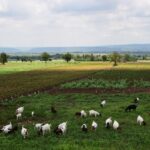Organic farming is gaining momentum across South Africa as more consumers seek out healthy, chemical-free produce. For small-scale farmers, organic practices offer a chance to tap into this growing market while building sustainable and environmentally friendly farms. Starting organic farming on a small scale may seem challenging, but with the right approach, it is both achievable and rewarding.
Before beginning your organic farming journey, it’s important to understand what organic farming really means. Organic farming avoids the use of synthetic fertilizers, pesticides, and genetically modified organisms (GMOs). Instead, it focuses on natural methods to enhance soil fertility, manage pests, and promote biodiversity. Organic farmers work with nature to maintain healthy ecosystems, using compost, crop rotation, companion planting, and biological pest control. It’s about producing food in harmony with the environment while meeting the highest standards for quality and safety.
Starting small allows you to learn and refine your techniques without overwhelming yourself. Choose a manageable plot of land where you can focus on a few crops or products. Whether you’re growing vegetables, herbs, fruit, or raising organic poultry, it’s better to start with a well-maintained small farm than to stretch yourself too thin.
Healthy soil is the foundation of organic farming. Begin by testing your soil to understand its pH levels and nutrient content. Based on the results, enrich the soil using organic compost, well-rotted manure, and cover crops such as clover or beans that add nitrogen. Avoid chemical fertilizers. Instead, practice crop rotation to prevent nutrient depletion and encourage soil health. Mulching also helps retain moisture, suppress weeds, and improve soil structure.
Selecting crops suited to your climate and soil is key to success. In South Africa, popular organic crops include spinach, kale, lettuce, carrots, tomatoes, herbs like coriander and basil, and indigenous vegetables such as amaranth and morogo. Choose disease-resistant varieties and diversify your crops to reduce the risk of pests and market fluctuations. Growing a variety of crops also promotes a healthy farm ecosystem.
In organic farming, pest and weed management relies on natural methods. Use crop rotation, intercropping, and companion planting to deter pests naturally. For example, planting marigolds among vegetables helps repel certain insects. Encourage beneficial insects such as ladybirds and lacewings that prey on harmful pests. You can also use homemade organic sprays made from garlic, neem oil, or chilli. When it comes to weeds, regular hand weeding, mulching, and cover cropping are effective strategies that eliminate the need for chemical herbicides.
If you plan to market your produce as “organic,” it’s important to follow recognised organic standards and consider obtaining certification. In South Africa, certification is available through organisations such as the Participatory Guarantee System South Africa (PGS SA) or Ecocert. Certification assures consumers that your produce meets strict organic guidelines, helping you access premium markets. Keep records of your farming practices, input sources, and harvests to support your certification process.
Building a market for your organic products is crucial. Start by selling locally — at farmers’ markets, through community-supported agriculture (CSA) programs, or directly to consumers via social media and farm stands. Restaurants, health food shops, and supermarkets are also potential buyers for certified organic produce. Build relationships with customers and educate them about the benefits of organic food to encourage repeat business.
Starting organic farming on a small scale in South Africa is a smart way for smallholders to enter a growing market while promoting sustainability and food security. By focusing on healthy soil, natural pest management, and mindful marketing, you can build a successful organic farm that benefits your family, your community, and the environment. With dedication and continuous learning, small-scale organic farming can offer both personal and financial rewards for years to come.
Join 'Farmers Mag' WhatsApp Channel
Get the latest Farming news and tips delivered straight to your WhatsApp
CLICK HERE TO JOIN






